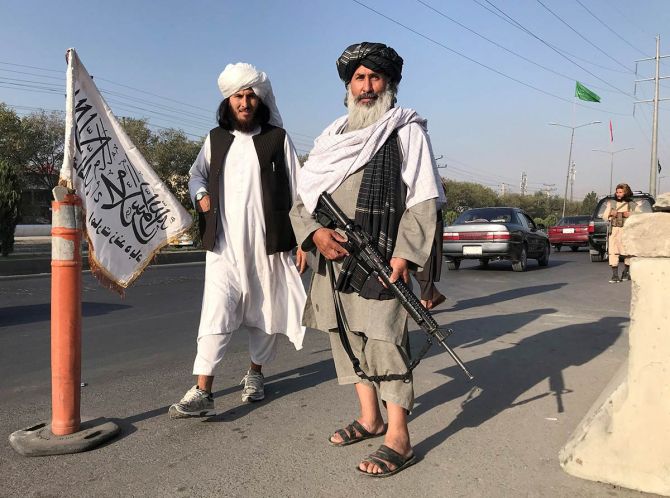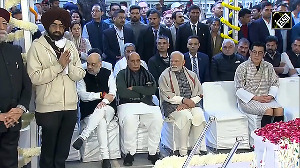Hours after expressing hope that the Taliban will form an "open and inclusive" Islamic government and ensure a smooth transition in Afghanistan, China has warned the Afghan militant group against the country once again becoming a "haven" for terrorists.

The remarks by China's deputy permanent representative to the UN, Geng Shuang, came during an emergency meeting of the Security Council on the situation in Afghanistan on Monday after the sudden and rapid takeover of the Afghanistan government by the Taliban insurgents.
"Afghanistan must never again become a haven for terrorists. This is the bottom line that must be held firmly for any future political solution in Afghanistan," Geng told an emergency meeting of the UN Security Council on the situation in Afghanistan held under India's presidency.
"We hope that the Taliban in Afghanistan will earnestly deliver on their commitments and make a clean break with the terrorist organisations," the state-run Xinhua news agency quoted him as saying.
"All countries should fulfil their obligations in accordance with international law and Security Council resolutions, work with each other in combating terrorism in all its forms and manifestations, and take resolute actions to prevent terrorist organisations such as the Islamic State, al-Qaida and the ETIM from taking advantage of this chaos (in Afghanistan)."
The East Turkestan Islamic Movement, which is stated to be an affiliate of al-Qaeda, is a militant group from China's volatile Xinjiang province. It is fighting for the independence of the province, which is home to 10-million Uygur Muslims.
The UNSC al-Qaeda Sanctions Committee has listed ETIM as a terrorist organisation in 2002.
The former Trump administration had removed the group from the US' list of terrorist organisations in 2020 amid allegations of human rights violations against Uygur Muslims by China in Xinjiang, including interning thousands of them in mass detention centres, which Beijing terms as education camps.
The US has termed China's security crackdown in Xinjiang as genocide against Uygur Muslims.
According to a recent UN report, hundreds of militants belonging to the ETIM are converging in Afghanistan amidst the military advances made by the Taliban.
Xinjiang shares borders with Afghanistan, Pakistan-occupied Kashmir besides Central Asian countries of Kazakhstan, Kyrgyzstan and Tajikistan.
In her media briefing here on Monday, Chinese Foreign Ministry spokesperson, Hua Chunying commenting for the first time on the Taliban takeover of Afghanistan has said: “China has noted that the Afghan Taliban said yesterday (Sunday) that the war in Afghanistan is over and that they will hold talks aimed at forming an open, inclusive Islamic government in Afghanistan and take responsible actions to protect the safety of Afghan citizens and foreign diplomatic missions”.
“China hopes these remarks can be implemented so as to ensure a smooth transition of the situation in Afghanistan, keep at bay all kinds of terrorism and criminal acts and make sure that the Afghan people stay away from war and can rebuild their homeland," she said in updated comments posted on the Ministry's website.
She struck a cautious note while replying to a question on when will China recognise the Taliban government and whether Beijing attached any condition for that.
"On the basis of fully respecting Afghanistan's national sovereignty and the will of all parties, Beijing has been maintaining contact and communication with the Taliban and playing a constructive role in promoting a political settlement," she said.
A Taliban delegation headed by the head of its Political Commission Mullah Abdul Ghani Baradar held talks with Chinese Foreign Minister Wang Yi at the Chinese city of Tianjin on July 24 during which Wang asked the militant group to make a clean break with all terrorist organisations, especially the ETIM.
Recalling the visit of Baradar, Hua said “We hope the Afghan Taliban can form solidarity with all factions and ethnic groups in Afghanistan, and build a broad-based and inclusive political structure suited to the national realities, so as to lay the foundation for achieving enduring peace in the country”.
“The Afghan Taliban said on multiple occasions that it hopes to grow sound relations with China, looks forward to China's participation in Afghanistan's reconstruction and development and will never allow any force to use the Afghan territory to engage in acts detrimental to China. We welcome those statements," she said.
China respects the Afghan people's right to decide on their own future independently. China is ready to continue to develop good-neighbourliness and friendly cooperation with Afghanistan and play a constructive role in Afghanistan's peace and reconstruction, she said.
The visit of the Taliban delegation headed by Baradar closely followed Pakistan Foreign Minister Shah Mahmood Qureshi's visit for talks with Wang.
China is banking on its all-weather ally Pakistan to pressure the Taliban to prevent the regrouping of ETIM militants on Xinjiang borders to stir up trouble there.
Critics say China is sceptical about the Taliban's will and ability to clamp down on groups like al-Qaeda and ETIM due to religious and ideological affiliations.
Blaming the chaos in Afghanistan to the hasty withdrawal of the troops by the US, Geng told the Security Council on Monday that the current humanitarian situation in Afghanistan is very dire.











 © 2024 Rediff.com -
© 2024 Rediff.com -